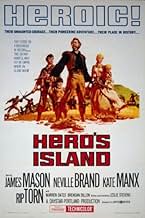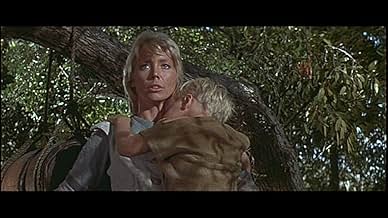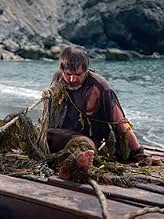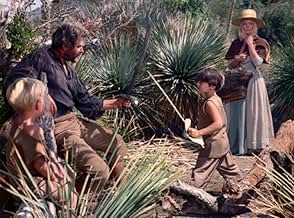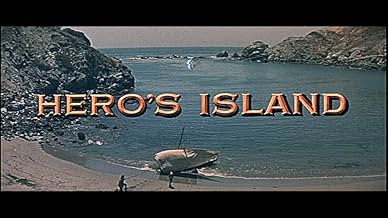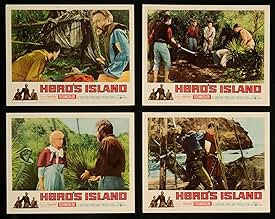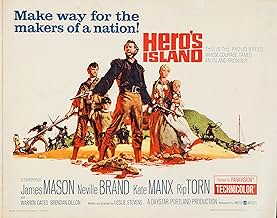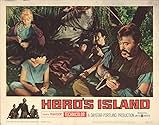In 1718, on a small island off the Carolina coast, a recently freed family of indentured servants plans to settle and homestead there but they run into conflict with a group of fishermen als... Read allIn 1718, on a small island off the Carolina coast, a recently freed family of indentured servants plans to settle and homestead there but they run into conflict with a group of fishermen also claiming ownership of the island.In 1718, on a small island off the Carolina coast, a recently freed family of indentured servants plans to settle and homestead there but they run into conflict with a group of fishermen also claiming ownership of the island.
Harry Dean Stanton
- Dixey Gates
- (as Dean Stanton)
John Hudkins
- Bullock
- (as John Hudkins Jr.)
Bobby Johnson
- Pound
- (as Robert Johnson)
- Director
- Writer
- All cast & crew
- Production, box office & more at IMDbPro
Featured reviews
There really was a Stede Bonnet,and,yes,indeed,he was a retired British Army major.Infantry,I believe.
This was in the days when officers bought their commissions,and,the second son of a wealthy merchant could rise through the ranks easily and quickly.Consequently,one could achieve status with a minimal degree of competance,and,in his case,ability.
Bonnet was described as a short,plump,pudgy,and rather epicene man,Certainly,he was nobody's physical ideal of a pirate.He had retired at a rather early age,married a woman of vicious temper,and became a planter in the West Indies.
The marriage was unhappy,and,as divorce was almost impossible during that period,Bonnet decided to run away from home,piracy being the most logical option,given the location and the period.Unfortunatly,he had NO idea as to how to sail or navigate,knew nothing about commanding a gang of psychopaths,and went so far as to buy his own ship(the usual practice was to STEAL one),outfit it via the usual legal channels,and advertise for a crew,openl stating that they were going to be pirates.They then set sail.
Needing advice,he fell into league with Edward Teach,the notorious Blackbeard.Teach invited Bonnet aboard,ostensibly for a sociable drink and to impart some fatherly advice.No sooner was Bonnet on deck,however,when Blackbeard placed him under house arrest,had his own men take over Bonnet's ship,and sailed off for further adventures.
Needless to say,Bonnet was humiliated.However,he took advantage of this period,nad became proficient as a sailor and navigator.Blackbeard,eventually tiring of his joke,released the hapless Major.Bonnet started his own career as a pirate,and,while lacking Teach's ferocity,had his own streak of viciousness.Consequently,he became a noted crininal in his own right.It seems,by the way,that he was the only pirate who is reocorded as using the legendary from of execution "Walking the Plank."
In 1716,Bonnet,along with many of his cohorts,received a pardon,but,after returning to piracy,was eventually captured and hanged.
This was in the days when officers bought their commissions,and,the second son of a wealthy merchant could rise through the ranks easily and quickly.Consequently,one could achieve status with a minimal degree of competance,and,in his case,ability.
Bonnet was described as a short,plump,pudgy,and rather epicene man,Certainly,he was nobody's physical ideal of a pirate.He had retired at a rather early age,married a woman of vicious temper,and became a planter in the West Indies.
The marriage was unhappy,and,as divorce was almost impossible during that period,Bonnet decided to run away from home,piracy being the most logical option,given the location and the period.Unfortunatly,he had NO idea as to how to sail or navigate,knew nothing about commanding a gang of psychopaths,and went so far as to buy his own ship(the usual practice was to STEAL one),outfit it via the usual legal channels,and advertise for a crew,openl stating that they were going to be pirates.They then set sail.
Needing advice,he fell into league with Edward Teach,the notorious Blackbeard.Teach invited Bonnet aboard,ostensibly for a sociable drink and to impart some fatherly advice.No sooner was Bonnet on deck,however,when Blackbeard placed him under house arrest,had his own men take over Bonnet's ship,and sailed off for further adventures.
Needless to say,Bonnet was humiliated.However,he took advantage of this period,nad became proficient as a sailor and navigator.Blackbeard,eventually tiring of his joke,released the hapless Major.Bonnet started his own career as a pirate,and,while lacking Teach's ferocity,had his own streak of viciousness.Consequently,he became a noted crininal in his own right.It seems,by the way,that he was the only pirate who is reocorded as using the legendary from of execution "Walking the Plank."
In 1716,Bonnet,along with many of his cohorts,received a pardon,but,after returning to piracy,was eventually captured and hanged.
10jespersc
Is blacknorth right in his review; is this "probably the finest film of the 60's"? In retrospect, that was a golden age, and Stevens' film was close in time to, for example, Dr. Strangelove, Psycho, Chimes at Midnight, Viridiana, or Jules and Jim. Even so, I agree, Hero's Island is superlatively accomplished. I would like to comment on just one aspect of the film that has been ignored by others: its formal perfection. The story of settlers with legal right to an island, versus fishermen claiming squatter's right, is told with utmost clarity and effect, partly due to the logic of its dramatic construction that takes the form of a series of moves across a shoreline, back and forth, according to the phases of the struggle. In brief:
--First, the settlers land on the island, unload their goods and raise a large cross to seal their ownership.
--Then, a drunk fisherman kills the settler, who falls out into the water, only his feet on land. He is, however, properly buried in his own soil.
--A pirate on a raft is washed ashore. Out of self-interest he helps chase the fishermen back to their boat.
--The younger fisherman opposes continued fighting and is thrown overboard. The settlers bring him to land.
--With money stolen from the settlers, the fishermen brings a brutal officer and bounty hunter from the mainland. With two soldiers, he takes up position on the beach. Here a sword fight eventually resolves the conflict. The fight carries on, from the sand into the water, and onto a boat; as the officer dies here, evil is exorcised from the island.
--The pirate flees the scene in a boat, leaving the widow of the settler and one fisherman as the owners of the land. This elementary scheme may not be noticed by the viewer, but the optimal use of minimal means, nevertheless, contributes to the film's strong impact.
--First, the settlers land on the island, unload their goods and raise a large cross to seal their ownership.
--Then, a drunk fisherman kills the settler, who falls out into the water, only his feet on land. He is, however, properly buried in his own soil.
--A pirate on a raft is washed ashore. Out of self-interest he helps chase the fishermen back to their boat.
--The younger fisherman opposes continued fighting and is thrown overboard. The settlers bring him to land.
--With money stolen from the settlers, the fishermen brings a brutal officer and bounty hunter from the mainland. With two soldiers, he takes up position on the beach. Here a sword fight eventually resolves the conflict. The fight carries on, from the sand into the water, and onto a boat; as the officer dies here, evil is exorcised from the island.
--The pirate flees the scene in a boat, leaving the widow of the settler and one fisherman as the owners of the land. This elementary scheme may not be noticed by the viewer, but the optimal use of minimal means, nevertheless, contributes to the film's strong impact.
Here's an underappreciated gem from the early 60s. Apparently a labour of love for co-producers James Mason and Leslie Stevens (who also wrote and directed), Hero's Island details the scramble for survival in the newly settled colony of Carolina. It raises interesting issues of ownership and propriety without sacrificing an exciting and realistic story. The cast is simply outstanding, particularly Warren Oates and (Harry) Dean Stanton in one of his earliest roles. Neville Brand is second billed but actually has quite a small role; future Andy Sidaris 'star' Darby Hinton gets a bigger chunk of screen time as a settler's son. The Panavision photography is uniformly outstanding, and frequently ravishingly beautiful as lensed by Ted McCord (Sound of Music, East of Eden, and many others).
With Catalina standing in for an island off the South Carolina coast in the early 18th century Hero Island according to the Films Of James Mason was shot within three weeks. No sets involved as it was all outdoors and more than likely the weather was cooperative.
Hero's Island finds Brendan Dillon, Kate Manx and their two small boys Morgan Mason and Darby Hinton and friend Warren Oates are there to settle the island as a condition of having worked off their indentured servitude. But three nasty fisherman are already there Rip Torn, Harry Dean Stanton and Robert Sampson and they mean to keep their island with no strangers. Dillon is killed right off and the others have to fend for their survival.
Help does come the sea in the form of James Mason whose been cast adrift by members of his crew. He proves to be their salvation especially after the fisherman go for help from Neville Brand who is a plantation overseer on the mainland.
Hero's Island is a tale of survival and a study of the character of all involved. The mixture of accents is rather weird with only Mason sounding like he truly belonged in the film. Kate Manx is interesting as she is a pious religious woman, but when her family is in danger, mother love overcomes all.
James Mason said that the producers had high hopes for the film. But the film did not do well at the box office.
Still it's an interesting work.
Hero's Island finds Brendan Dillon, Kate Manx and their two small boys Morgan Mason and Darby Hinton and friend Warren Oates are there to settle the island as a condition of having worked off their indentured servitude. But three nasty fisherman are already there Rip Torn, Harry Dean Stanton and Robert Sampson and they mean to keep their island with no strangers. Dillon is killed right off and the others have to fend for their survival.
Help does come the sea in the form of James Mason whose been cast adrift by members of his crew. He proves to be their salvation especially after the fisherman go for help from Neville Brand who is a plantation overseer on the mainland.
Hero's Island is a tale of survival and a study of the character of all involved. The mixture of accents is rather weird with only Mason sounding like he truly belonged in the film. Kate Manx is interesting as she is a pious religious woman, but when her family is in danger, mother love overcomes all.
James Mason said that the producers had high hopes for the film. But the film did not do well at the box office.
Still it's an interesting work.
Obviously somebody thought they had a good idea for a film, where religious beliefs could get in the way of common sense, and "Hero's Island"is that film. Shot entirely in one location, Catalina Island, the story lacks excitement, and quite frankly is pretty boring. The only saving grace is seeing the great character actors in 1962, and what a wonderful cast it is. Rip Torn, Harry Dean Stanton, Neville Brand, James Mason, and Warren Oates. Kate Manx is the Bible thumping woman, who's religion rules her every decision. My thought is that it's just not worth wading through all the uninteresting scenes to finally arrive at the swashbuckling conclusion. For fans of the actors only, unless you need something guaranteed to be sleep inducing. - MERK
Did you know
- TriviaMorgan Mason (I), who plays Cullen, is the son of James Mason (I).
Details
- Runtime1 hour 34 minutes
- Aspect ratio
- 2.35 : 1
Contribute to this page
Suggest an edit or add missing content


